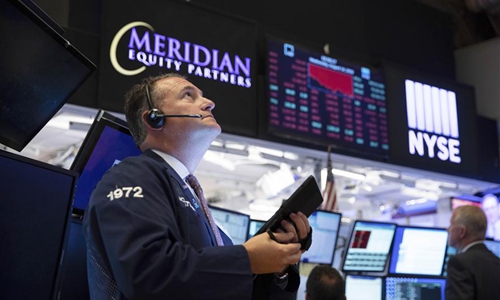Chinese companies to turn to HK and mainland bourses amid tougher IPO environment in US
By Xie Jun Source:Global Times Published: 2020/5/21 21:58:40

A trader works at the New York Stock Exchange in New York, the United States, on Aug. 14, 2019. U.S. stocks closed remarkably lower on Wednesday, as persisting fears over an imminent recession struck a blow to the already-dampened investor sentiment. The Dow plunged 800.49 points, or 3.05 percent to 25,479.42, marking the largest daily decline of the year so far. The S&P 500 decreased 85.72 points, or 2.93 percent, to 2,840.60. The Nasdaq Composite Index fell 242.42 points, or 3.02 percent, to 7,773.94. Photo:Xinhua
The bill, which was passed by the US Senate on Wednesday, bars the shares of any companies from being listed on US stock exchanges unless it complies with US audits for
three years in a row. It also requires companies to certify that they are not owned or controlled by a foreign government.
The new legislation targeted at China as the Trump administration intensified economic action against China in recent days, according to overseas media reports. Some media also said that the new law might lead to Chinese tech giants like Alibaba and Baidu being barredfrom listing on US stock markets.
Well-known Chinese companies listed in US saw shares plunged in premarket trading on news of the legislation. Baidu was down about 5 percent at one point but recovered with a rise of 0.94 percent as of press time, while Alibaba was down 1.50 percent.
Baidu CEO Li Yanhong said that Baidu is discussing what the company can do to cope with the situation, including the possibility of a secondary listing in Hong Kong and
other places. Alibaba refused to comment when contacted by the Global Times.
Wu Chaoming, chief economist at Chasing Securities, said that with such a prejudicial mindset, the US might mistakenly take action against some qualified Chinese companies
listed in the US, and cause some US-listed Chinese companies to return to A-share markets.
"This is a reflection of the changes in China-US relations and possibilities exist that it arose from political reasons. If so, it is unfair and violates the principles of the market
economy," Wu told the Global Times.
The new legislation also raised some sort of uncertainties for Chinese companies which are already in the middle of a process to apply for a US listing. Chinese online grocery firm Dada, which recently filed for an IPO in the US, declined to comment when asked by the Global Times.
Xi Junyang, a professor at the Shanghai University of Finance and Economics, said it's unlikely that Chinese companies would give up IPO application if they are already in the process of doing it, but for Chinese companies that only have listing plans, it's very likely that they will shy away from seeking IPOs in the US.
"The number of Chinese companies seeking IPOs in the US will largely decrease, as companies will worry about whether the US will roll out increasingly austere actions against Chinese firms as the China-US strategic competition rages on," Xi told the Global Times.
He also said that it will prompt US-listed companies to delist from the US markets and seek listings on the A-share markets or in Hong Kong.
Dong Shaopeng, an adviser to the China Securities Regulatory Commission, told the Global Times that the actions against US-listed Chinese companies would eventually hurt US investors' opportunities to share bonus of Chinese firms. It would also hurt Wall Street's influence which used to be known for being impartial and all inclusive to global companies.
Posted in: ECONOMY